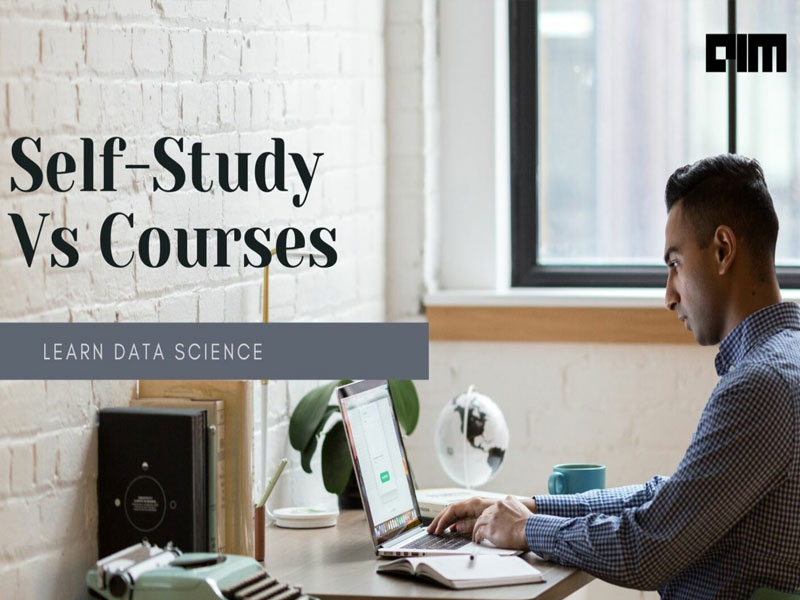Consumer Data Protection: Data Scientists And Data Security
SOURCE: WWW.DISCOVERDATASCIENCE.ORG/
AUG 14, 2023
Self study or full-time: What suits a data science aspirant
SOURCE: ANALYTICSINDIAMAG.COM
SEP 01, 2021

Learner needs to narrow down the skills they want to master, and then create a plan to accomplish their end goals.
The Data Science community advocates for both formal and informal education sets, having their own pros and cons. However, keeping in mind that there is no “right way” to study or pursue a career in data science – a self-study plan is not an alien concept. So, let’s dive deep for a detailed comparison between the two on various aspects.
The field of data science looks for skills and problem-solving attitudes. Getting degrees is an accomplishment, but degrees alone offer no guarantee of landing a job. Pick up a programming language (Python or R), learn how to code, and practise fundamental concepts such as calculus, statistics, probability, regression analytics, etc. Once the foundation is well-laid, go for advanced specialisation in neural networks, machine learning, and deep learning. One is not required to know everything. A well-executed self-study programme keeping the focus area in mind will equip an aspirant to gain in-depth domain knowledge and learn ingenious techniques. Even though the process seems smooth, it can be time-consuming with irregular study habits, frequent struggles to understand, find, and solve problems — thereby challenging to tread on.
Turn the tables; each domain of data science needs specific skill-sets. A full-time data science course provides a structured program. It opens up the possibility to work with like-minded people and get exposure to real-life problems, and ultimately sets a solid foundational base. It further ensures access to theoretical principles, practical modules, and regular tests. Additionally, experienced professors and industry experts as faculty is an add-on. Experts often advise going for a full-time course for those without any background in computer science and mathematics.
While applying for a tech position, a degree from a full-time course might help you get an interview; but it is not a key qualifying factor to grab the job. A lot of tools are coming in within no time. Self-study gives aspirants the luxury to continue levelling up their skill-sets with lots of online resources, regular participation in hackathons and joining discord servers – without a time constraint. Self-discipline, accountability, and solid time management skills are frequently required for independent study. However, if you are committed to studying, it will be pretty beneficial.
As the data science landscape is constantly evolving, the syllabus taught in a full-time course might get outdated. However, the fundamentals taught will remain the same. In addition, one can do various other short or long-term certification courses to scale and hone up their capabilities required in the industry
During the self-learning journey, keeping track of valuable resources remains the key challenge. Stack Overflow, the online community platform, is suitable for beginners for data-science-related queries. However, one needs to build their own reliable resources by asking for expert advice, following relevant blogs, YouTube channels, podcasts, audiobooks, etc. Video tutorials are helpful to an extent while getting stuck in a problem. Once the starting point is set, aspirants need to explore different channels and mediums. On the other hand, those enrolled in a full-time course enjoy constant touch with the faculty, clear their doubts when stuck, and ask experienced faculty members for books and resources.
Both full-time and self-study have their own gains and losses. A self-study is a suitable option for many. However, aspirants need to expand their learning options, consult various resources, and remain diligent and active learners in their own studies. It is crucial to find the purpose behind what a learner is actually learning. Similarly, a full-time course does provide credibility and brings value to the student. The structured programme also provides the chance to go for internships and work on industry-specific problems, thereby giving those enrolled an edge over others.
The call to opt for the best mode of study depends on one’s own assessment. Learners need to narrow down the skills they want to master, and then create a plan to accomplish their end goals.
LATEST NEWS
WHAT'S TRENDING


Data Science
5 Imaginative Data Science Projects That Can Make Your Portfolio Stand Out
OCT 05, 2022

SOURCE: WWW.DISCOVERDATASCIENCE.ORG/
AUG 14, 2023
SOURCE: MEDIUM.DATADRIVENINVESTOR.COM
OCT 05, 2022
SOURCE: VENTURESAFRICA.COM
OCT 05, 2022